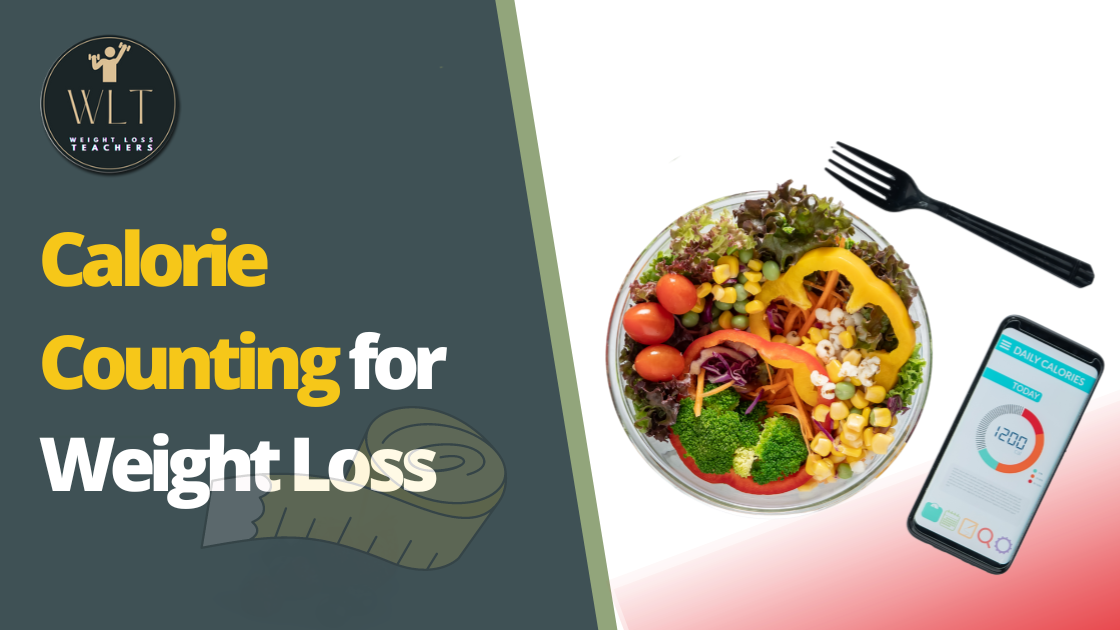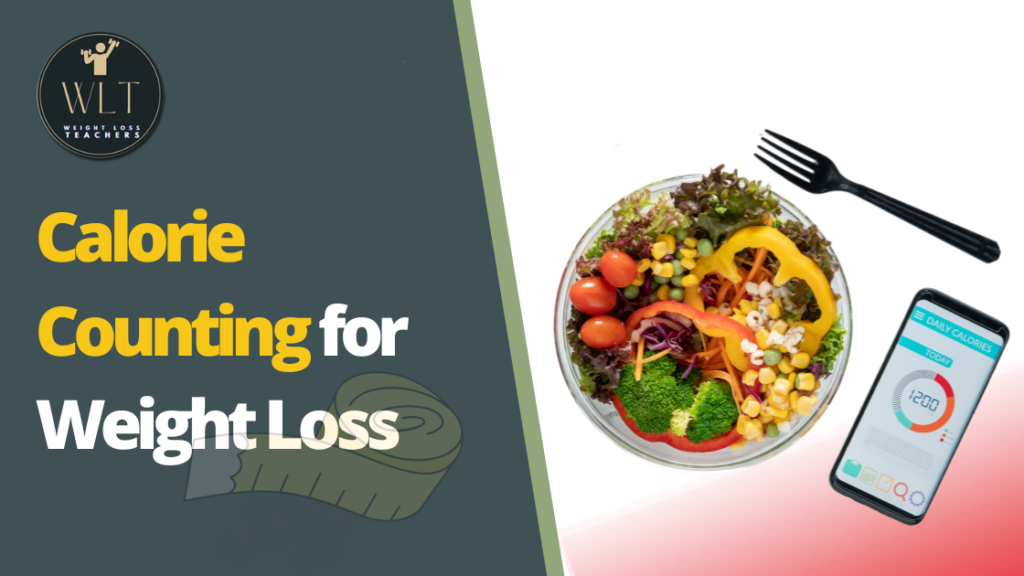
Calorie Counting for Weight Loss

In today’s world, where obesity is becoming an epidemic, weight loss has become a primary concern for many. People try various diets, workout routines, and lifestyle changes to achieve their weight loss goals. However, one of the most effective and scientifically proven methods of weight loss is calorie counting.
Table of Contents
Introduction
Calorie counting is a method of tracking the number of calories you consume each day and adjusting your intake to achieve a calorie deficit. A calorie deficit is when you consume fewer calories than your body needs, which leads to weight loss. In this article, we will delve deeper into the concept of calorie counting, its benefits, and how to get started.

Understanding Calories

Before we delve into the intricacies of calorie counting, it’s crucial to grasp the fundamental concept of what a calorie represents. A calorie is a unit of energy employed to quantify the amount of energy present in the food and beverages we consume. This measurement is based on the energy required to elevate the temperature of one kilogram of water by a single degree Celsius. This seemingly simple unit of measurement is of paramount importance in comprehending our nutritional intake and its impact on our bodies.
The human body, much like an intricately designed machine, necessitates a continuous supply of energy to carry out its myriad functions. This energy is derived directly from the foods we ingest. In essence, calories serve as the fuel that powers our physiological processes, from breathing and circulating blood to more active pursuits like running or playing sports.
The number of calories contained in a particular food or beverage hinges on its composition, primarily the macronutrients it contains. Macronutrients are the three primary categories of nutrients that constitute the bulk of our diet: carbohydrates, proteins, and fats.
Carbohydrates are energy-dense and provide approximately four calories per gram. They serve as the body’s preferred source of energy and are found in various forms, ranging from simple sugars like glucose to complex carbohydrates like starches found in grains and vegetables.
Proteins, another essential macronutrient, also contribute roughly four calories per gram. These molecular powerhouses are not only vital for repairing and building tissues but also serve as an energy source when carbohydrates are in short supply.
Fats, while often demonized, are a concentrated source of energy, supplying a more calorie-dense nine calories per gram. They play a crucial role in insulating and protecting vital organs, and they’re involved in numerous metabolic processes.
Notably, alcohol, though not classified as a macronutrient, bears its own caloric load, providing approximately seven calories per gram. Understanding the calorie content of alcoholic beverages is particularly relevant for those looking to manage their caloric intake.
In essence, calories are the currency of energy in the nutritional world. To maintain a healthy and balanced diet, it’s imperative to be aware of both the quantity and quality of the calories we consume, as they directly impact our overall health and well-being. Armed with this knowledge, we can make informed choices about our dietary habits and, ultimately, our lives.
Benefits of Calorie Counting for Weight Loss

Calorie counting is a widely recognized and effective method for achieving weight loss and maintaining a healthy lifestyle. It involves meticulously tracking the number of calories you consume through food and beverages and comparing them to the number of calories your body requires for its daily functions. This practice creates a calorie deficit, which is the cornerstone of successful weight loss. However, the advantages of calorie counting extend far beyond simply shedding pounds. Let’s delve into the multifaceted benefits of adopting this approach to achieve your weight loss goals.
Creating a Calorie Deficit
At the heart of any weight loss journey lies the concept of a calorie deficit. To shed excess pounds, you must consistently consume fewer calories than your body expends. Calorie counting provides you with the tools to achieve and maintain this deficit. By diligently tracking your calorie intake, you gain a precise understanding of how many calories you’re consuming versus how many your body requires. This awareness empowers you to make informed decisions about your food choices and portion sizes, ensuring that you consistently operate in a calorie deficit. Over time, this deficit leads to gradual and sustainable weight loss.
Promoting Healthier Food Choices
One of the most transformative benefits of calorie counting is its ability to foster a heightened awareness of the nutritional content of the foods you eat. As you diligently log your meals and snacks, you become intimately acquainted with the calorie content of various foods and beverages. This knowledge empowers you to make healthier food choices. You begin to gravitate towards foods that offer more nutrients per calorie, such as fruits, vegetables, lean proteins, and whole grains. Simultaneously, you become more discerning about avoiding high-calorie, low-nutrient foods like sugary snacks and fatty fried dishes. Calorie counting, in essence, acts as a guide that steers you toward a balanced and nutrient-rich diet, not just for weight loss but for overall health.
Providing Accountability
Accountability is a powerful motivator on the weight loss journey, and calorie counting excels in this regard. When you track your calorie intake diligently, you hold yourself accountable for the food you consume. You’re less likely to indulge in unhealthy eating habits or engage in mindless snacking when you’re acutely aware of the number of calories each bite represents. The act of logging your meals and snacks becomes a daily commitment to your health and fitness goals. This sense of accountability can help you stay on track, resist temptation, and maintain consistency in your dietary choices.
Flexibility and Customization
One of the standout features of calorie counting is its inherent flexibility. Unlike rigid diets that prescribe specific foods or meal plans, calorie counting allows you to tailor your dietary approach to your unique needs and weight loss goals. It accommodates individual preferences, dietary restrictions, and cultural considerations. You can customize your calorie intake based on factors like age, gender, activity level, and desired rate of weight loss. This adaptability ensures that calorie counting is an inclusive and sustainable approach that can be adjusted to suit various lifestyles. Whether you prefer a higher-protein, lower-carb regimen or a balanced mix of all macronutrients, calorie counting provides the framework for personalization, making it a versatile strategy for achieving and maintaining weight loss.
Enhancing Portion Control
Portion control is a pivotal aspect of calorie counting. By measuring and recording the foods you eat, you gain a more precise understanding of appropriate portion sizes. Many individuals inadvertently overeat due to a lack of awareness about serving sizes. Calorie counting equips you with the tools to recognize portion sizes that align with your calorie goals. This skill extends beyond your weight loss journey and can contribute to healthier eating habits in the long term. Learning how to gauge portion sizes effectively can prevent overindulgence and help you maintain your desired weight once you’ve reached your goals.
Encouraging Mindful Eating
Calorie counting encourages mindfulness in eating. Rather than mindlessly consuming whatever is in front of you, you become intentional about your food choices. You pay closer attention to hunger cues, savor each bite, and make conscious decisions about what, when, and how much to eat. This mindful approach not only aids in weight loss but also promotes a healthier relationship with food. It helps break the cycle of emotional or impulsive eating and fosters a greater appreciation for the sensory pleasures of eating.
In short, calorie counting is a versatile and effective tool for weight loss that offers numerous benefits beyond its primary objective. It empowers individuals to create and maintain a calorie deficit, make healthier food choices, stay accountable to their goals, and customize their approach to suit their unique needs. Furthermore, it enhances portion control, encourages mindful eating, and lays the foundation for lasting dietary improvements. While calorie counting may not be the sole solution for everyone, its proven track record and adaptability make it a valuable resource in the pursuit of a healthier, happier, and more balanced life.
How to Get Started with Calorie Counting

Embarking on a calorie counting journey can be a powerful and effective way to take control of your diet and achieve your weight loss goals. With a clear understanding of the benefits of calorie counting, it’s time to delve into the practical steps to get started on this path to healthier eating and sustainable weight loss. Here’s a comprehensive guide on how to begin your calorie counting journey:
Calculate Your Daily Calorie Needs
The foundation of successful calorie counting lies in understanding your body’s unique energy requirements. Your daily calorie needs represent the number of calories your body requires to maintain its current weight, factoring in your age, gender, height, weight, and activity level.
Start by using an online calorie calculator or consult with a registered dietitian to determine your baseline daily calorie needs. These calculators take into account key factors that influence your energy expenditure, such as your Basal Metabolic Rate (BMR) – the calories your body burns at rest – and your Physical Activity Level (PAL). Keep in mind that this is a crucial initial step, as it forms the basis for setting your calorie intake target.
Set a Weight Loss Goal
Armed with knowledge of your daily calorie needs, the next step is to establish a clear and realistic weight loss goal. A sustainable rate of weight loss is typically one to two pounds per week. Aim for gradual and steady progress, as crash diets or extreme calorie restrictions are neither healthy nor sustainable in the long term.
Consider factors like your current weight, desired target weight, and the timeline you’re comfortable with. Remember that setting a reasonable goal not only promotes safe weight loss but also helps maintain your motivation throughout the journey.
Track Your Calorie Intake
With your calorie target in mind, it’s time to start tracking your calorie intake. There are various methods to accomplish this, ranging from traditional food journals to modern calorie counting apps. Choose the method that aligns with your preferences and lifestyle.
When tracking your calories, accuracy is paramount. Measure your food portions carefully using kitchen scales or measuring cups to ensure your calorie count is as precise as possible. Pay attention to ingredient labels, and consider using a food database within a calorie tracking app to look up nutritional information for packaged items or restaurant meals.
Additionally, remember that beverages also contribute to your daily calorie intake. Don’t overlook the calories from drinks like sugary sodas, fruit juices, or alcoholic beverages, as they can significantly impact your overall calorie consumption.
Adjust Your Calorie Intake

As you progress in your calorie counting journey, it’s essential to remain adaptable and open to adjustments. If you find that your weight loss is not progressing as expected, you may need to modify your calorie intake. Here are two common scenarios:
- Not Losing Weight: If you’re not seeing the desired results on the scale, it may be necessary to reduce your calorie intake slightly. A small reduction in daily calories can create a more significant calorie deficit, which can jumpstart your weight loss progress.
- Losing Weight Too Quickly: On the flip side, if you’re shedding pounds too rapidly, it’s crucial to ensure that you’re still meeting your nutritional needs. Gradual and sustainable weight loss is healthier in the long run. In this case, consider increasing your daily calorie intake slightly to strike a better balance between weight loss and overall well-being.
Keep in mind that adjustments should be made cautiously, with attention to your overall health and well-being. Consulting with a healthcare professional or registered dietitian can provide valuable guidance in fine-tuning your calorie intake for optimal results.
Stay Consistent
Consistency is the linchpin of successful calorie counting. Make it a daily habit to track your calorie intake accurately. The more consistent you are, the more reliable your results will be. Here are some tips to maintain consistency:
- Plan Your Meals: Pre-plan your meals and snacks whenever possible. Knowing what you’ll eat in advance makes it easier to stay within your calorie limits.
- Record Everything: Don’t skip recording any food or beverage, no matter how small or seemingly insignificant. Every calorie counts.
- Be Mindful of Portion Sizes: Continue practicing portion control by measuring or estimating portion sizes accurately.
- Stay Educated: Stay informed about the calorie content of foods you commonly consume, making it easier to estimate calorie intake when necessary.
- Use Technology: Leverage the convenience of calorie tracking apps that provide a comprehensive food database, making it easier to log your meals and monitor your progress.
Remember that consistency is not only about tracking calories but also about adhering to your overall weight loss plan. Incorporate regular physical activity and prioritize balanced nutrition to support your calorie counting efforts.
Therefore, calorie counting is a powerful tool for achieving weight loss and promoting healthier eating habits. By starting with the fundamentals of calculating your daily calorie needs, setting realistic goals, diligently tracking your calorie intake, making necessary adjustments, and maintaining consistency, you can embark on a journey towards improved health and a more balanced lifestyle. Remember that patience and persistence are key, as sustainable weight loss is a gradual process that ultimately leads to lasting benefits for your overall well-being.
Tips for Successful Calorie Counting: A Roadmap to Nutritional Awareness

Calorie counting is a potent tool for those seeking to manage their weight, improve their dietary choices, and cultivate a healthier relationship with food. While it may initially seem like a meticulous endeavor, mastering the art of calorie counting can significantly impact your overall well-being. To help you navigate this journey successfully, consider these tips that extend beyond mere calorie counting, fostering a holistic approach to nutrition and lifestyle.
Plan Your Meals
Meal planning is a cornerstone of successful calorie counting. When you prepare your meals in advance, you gain more control over your calorie intake. This practice empowers you to make deliberate choices, ensuring that your meals align with your calorie goals and nutritional needs.
Start by creating a weekly meal plan that incorporates a variety of foods from different food groups. Include plenty of fruits, vegetables, lean proteins, and whole grains to provide essential nutrients while managing your calorie intake. When you have a plan in place, you’re less likely to resort to impulsive eating or opt for convenience foods that may be high in calories and low in nutritional value.
Additionally, meal planning can save you time and money, as it reduces the temptation to dine out or order takeout frequently. By choosing healthier ingredients and preparing meals at home, you can exert greater control over portion sizes and the quality of your ingredients.
Measure Your Portions
Precise portion control is a fundamental aspect of effective calorie counting. While many foods come with recommended serving sizes on their packaging, it’s crucial to confirm these measurements using kitchen tools like measuring cups and food scales. Accurate measurements ensure that your calorie count remains reliable.
When measuring portions, pay particular attention to high-calorie items like nuts, oils, and grains. These foods can quickly contribute to your daily calorie intake if not measured accurately. Learning to eyeball portion sizes can also be helpful for situations where measuring tools aren’t readily available. Over time, you’ll become more skilled at estimating portion sizes, but initially, err on the side of caution by using precise measurements.
Be Honest
Honesty is the linchpin of successful calorie counting. It’s vital to maintain integrity in your tracking efforts. This means being truthful with yourself about the foods you consume and the sizes of your portions. Remember that calorie counting is a personal journey, and its efficacy hinges on your commitment to accuracy.
When you track your calories meticulously, even the occasional indulgence or treat can fit within your overall dietary plan. Being honest about these choices allows you to strike a balance between enjoying your favorite foods and staying within your calorie limits. It’s not about perfection but rather about awareness and accountability.
Don’t Obsess
While calorie counting is a valuable method for achieving weight loss and dietary awareness, it’s essential to strike a balance and avoid becoming consumed by it. Obsessive tracking or excessive focus on calories can lead to an unhealthy relationship with food. Remember that food is not merely a collection of calories but a source of nourishment, pleasure, and social connection.
Instead of obsessing over calorie numbers, shift your mindset towards making healthier choices. Focus on the nutritional quality of the foods you consume. Aim to incorporate whole, nutrient-dense foods into your diet, such as colorful vegetables, lean proteins, and fiber-rich grains. By prioritizing the quality of your food choices, you can naturally align your calorie intake with your health and weight goals.
Furthermore, try to enjoy your meals mindfully. Savor each bite, paying attention to taste, texture, and satiety cues. Eating with mindfulness can help you better regulate your food intake and enhance your overall eating experience.
Be Patient
Patience is a virtue when it comes to weight loss and calorie counting. Understand that achieving your desired weight and health goals is a gradual process that requires time and consistency. Set realistic expectations, and don’t be discouraged by occasional setbacks or fluctuations in your progress.
Remember that weight loss isn’t solely about the destination but also about the journey and the lessons learned along the way. Embrace the positive changes you make in your dietary habits and lifestyle, regardless of the scale’s immediate feedback. Sustainable weight loss is about adopting healthier habits that you can maintain for the long term.
Keep in mind that everyone’s weight loss journey is unique. What works for one person may not work for another, so it’s essential to focus on your own progress and what feels sustainable and manageable for you.
In summary, calorie counting can be a transformative tool for improving your dietary choices and achieving your weight loss goals. While the tips mentioned here emphasize the importance of precision in tracking calories, they also underscore the significance of a well-rounded approach to nutrition and well-being. By planning your meals, measuring portions accurately, practicing honesty in tracking, avoiding obsession, and cultivating patience, you can embark on a calorie counting journey that not only leads to a healthier body but also a more balanced and mindful relationship with food.
Note: There might be affiliate links mentioned here. We may receive a commission if you purchase a product through an affiliate link. There is no additional charge for you. Please do your own research before making any online purchases.
FAQs (Frequently Asked Questions)
Q1. What is calorie counting, and why is it essential for weight loss?
A1. Calorie counting is a method of tracking the number of calories you consume each day and adjusting your intake to create a calorie deficit. A calorie deficit, where you consume fewer calories than your body needs, is crucial for weight loss. It helps your body tap into its stored energy (fat) to make up the difference, resulting in gradual and sustainable weight loss.
Q2. What is a calorie, and why is it important to understand it?
A2. A calorie is a unit of energy used to measure the energy content in food and beverages. Understanding calories is vital because they represent the fuel our bodies need to function. By knowing how many calories you consume, you can make informed choices about your diet and work toward achieving your health and weight goals.
Q3. What are macronutrients, and how do they relate to calorie counting?
A3. Macronutrients are the three primary categories of nutrients in our diet: carbohydrates, proteins, and fats. Each macronutrient provides a different number of calories per gram—carbohydrates and proteins offer four calories per gram, fats provide nine calories per gram, and alcohol, although not a macronutrient, contributes seven calories per gram. Calorie counting involves tracking the intake of these macronutrients to manage your daily calorie consumption effectively.
Q4. What is a calorie deficit, and why is it crucial for weight loss?
A4. A calorie deficit occurs when you consume fewer calories than your body needs to maintain its current weight. It’s the foundation of weight loss because it forces your body to use its stored energy reserves (fat) to meet its energy demands. Achieving and maintaining a calorie deficit is essential for gradual and sustainable weight loss.
Q5. How can calorie counting help me make healthier food choices?
A5. Calorie counting fosters awareness of the calorie content of various foods and beverages. This knowledge empowers you to make healthier food choices by gravitating toward nutrient-dense options while avoiding high-calorie, low-nutrient foods. It guides you toward a balanced and nutrient-rich diet, promoting overall health in addition to weight loss.
Q6. Why is accountability important in calorie counting?
A6. Accountability is a powerful motivator when it comes to weight loss. Tracking your calorie intake holds you accountable for the food you consume, making it less likely for you to indulge in unhealthy eating habits or mindless snacking. It reinforces your commitment to your health and fitness goals.
Q7. Can I personalize my calorie counting approach based on my needs and preferences?
A7. Yes, calorie counting is highly customizable. You can tailor your calorie intake to your unique needs, considering factors like age, gender, activity level, and desired rate of weight loss. This adaptability ensures that calorie counting can accommodate various lifestyles and dietary preferences.
Q8. How does calorie counting enhance portion control?
A7. Calorie counting promotes portion control by encouraging you to measure and record the foods you eat accurately. It helps you become more aware of appropriate portion sizes, preventing overindulgence. Developing portion control skills can contribute to healthier eating habits in the long term.
Q9. What role does mindful eating play in calorie counting?
A9. Calorie counting encourages mindful eating by making you more intentional about your food choices. It helps you pay closer attention to hunger cues, savor each bite, and make conscious decisions about what, when, and how much to eat. This mindful approach fosters a healthier relationship with food and breaks the cycle of emotional or impulsive eating.
Q10. Why is patience essential in calorie counting and weight loss?
A10. Patience is vital in weight loss because it’s a gradual process that requires time and consistency. Setting realistic expectations and embracing the journey can help you maintain motivation despite occasional setbacks. Sustainable weight loss is about adopting healthier habits that you can maintain for the long term, rather than seeking quick fixes.
Conclusion
Calorie counting is a proven method of weight loss that offers several benefits. By tracking your calorie intake and creating a calorie deficit, you can achieve your weight loss goals in a safe and sustainable manner. Remember to calculate your daily calorie needs, set a weight loss goal, track your calorie intake, and stay consistent. With patience and dedication, you can achieve your desired weight loss results.
Disclaimer: The information provided in this article is for educational purposes only and should not be considered as a substitute for medical advice. Consult a healthcare professional before implementing any home remedies or making significant changes to your lifestyle.






